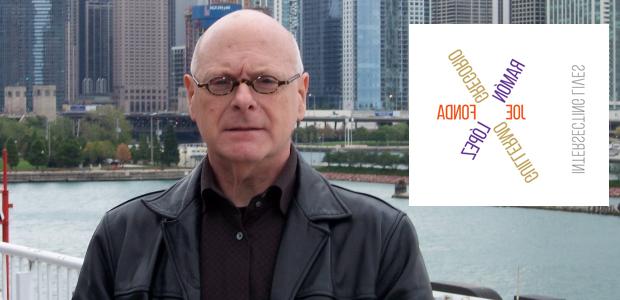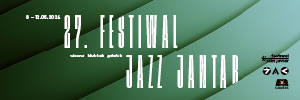Listening is the most important thing - an interview with Guillermo Gregorio

How is to work with Rafał Mazur?
Guillermo Gregorio: It is extremely rewarding. From the very beginning we understood each other musically - be it on stage during a concert, at the recording studio, or simply rehearsing. Rafał is very open and possesses an extraordinary and very subtle sense of receptivity. He knows how to listen to. That makes it possible to interact fluently. Moreover, an improvisation with Rafał instantly acquires a compositional character. And that’s what I enjoy the most, the possibility to really compose at the spot. Interaction and the possibility to produce spontaneously something meaningful is not magical. It is an attitude, a desire to achieve it. Everything is based on listening, which requires an open mind, indeed.
Do you remember when and how the collaboration with Rafał Mazur began?
GG: Certainly, I remember it perfectly. It was on February 2017. I had the opportunity to travel to Krakow for reasons other than musical. A few weeks before my trip a friend suggested me to contact Marek Viniarski. At that moment I knew about Marek only through his label and musicians who have recorded for him but had never met him personally. I contacted him and Marek, who knew several of my records, particularly those I recorded for hatArt, appeared enthusiastic about my visit and arranged a duo concert with Rafał at Alchemia. When we met with Rafał to play for the first time, after a few minutes of playing, I started feeling that everything was going to work very well. And I was not mistaken. Our playing was very good received by the audience and we also liked it a lot. That is what motivated Rafał to organize a couple of recording sessions later that year.
You have released a new album with Rafał Mazur and Ramon Lopez on drums. Could you tell me something about sessions for “Wandering the Sounds?”
GG: It was only one session. As I commented earlier, I had played with Rafał at Alchemia and enjoyed a lot. But I had not played with Ramón before our recording session. From the very beginning I felt pretty much the same about Ramón as I did about Rafał. Ramón, like Rafał, has a great capacity to listen to and I believe this is very important if you want to achieve a successful and creative musical interaction. In my perception the musical results were very peculiar and very compositional at the same time. I was very happy about it.
You’ve lived in so many different places. Firstly you’ve been born in Argentina, but you lived also in Los Angeles, Vienna and Chicago. Does living in different places and traveling have an influence on what you do as a musician? What do you think about it?
GG: I assume that it has necessarily an influence - if you want to use that term - on an individual who tries to be creative. Obviously diversity and the experience of different contexts activate many things in the mind of somebody who looks for new “reactive points” to initiate new syntheses. But it is not so easy to do a precise evaluation of its importance in one’s life. In my case, I feel there is some kind of continuity between my experiences in those different countries and milieus where I have lived. In Buenos Aires, for example, I started listening to New Orleans Jazz when I was fourteenth years old, “Contemporary” or “20th century music” (as it was called then) when I was seventeen years old, and Free Jazz since 1960 or 1961. I got also entangled in “Third Stream Music” (a dated concept today but meaningful at that time) and ended up doing music that they keep calling “experimental” (whatever it means) and also “Fluxus” activities. Also, since I was a teenager I was deeply interested in 20th century visual arts. After leaving Argentina, I had the opportunity to experience the creative music scene that flourished during the ‘70s and ‘80s, that fruitful convergence of Free Jazz and 20th century music and its interconnections with visual art, which I experienced particularly in Vienna and Germany.
I’m convinced that the interaction with composers and artists of that milieu at that time constituted an indelible mark in my further explorations. No doubt about it. Later, when I arrived in Chicago I discovered that that European scene was in the center of the interest of musicians and audience, as well as in the mind of writers, critics, organizers and reviewers. European musicians were frequently visiting Chicago, invited by cultural organizations or private venues. There were many musicians in Chicago who were related to that kind of “aesthetic” and wanted to play and participate in recording sessions. Important labels were interested in recording that music. Everybody was enthusiastic about it. I believe I developed perhaps my more important projects in Chicago, working with first rate musicians all the time (That city had plenty of them!). After living more than twenty years in Chicago I moved three years ago to New York City where I currently reside. It is a new context with new suggestions and peculiarities, no doubt. I don’t know to what extent my work had already changed or would change. However, I feel everything I’m doing is to certain extent also conditioned by what I did and experienced in previous contexts. There is a kind of continuity that would be perhaps interesting to explore in addition to
the changing influences.
In the late ‘60s you’ve recorded tape and free improvisation music which can be found on “Otra Música.” You’re also much into free jazz, avant-garde and modern classical. Can you say that you are more into improvisation and experimental music than to composed and classical music?
GG: I’m not sure I can say that. I feel that there is a strong link between my compositional and improvisational activities. I am very fond of a kind of improvisation with strong compositional connotations. I like to improvise composing jointly with the others at the moment. Composing in “real time” we could say. Good listeners are important for that purpose. Good listening doesn’t necessarily inhibit spontaneity. Improvising with a group and composing writing on a paper or at the computer are of course different experiences. I keep doing the two things anyway and I can’t see major contradictions. If the term experimental in music means “innovative,”unconventional,” well...I tried to do that. But that should be confirmed by the listeners, not by me. I think that my attitude is rather exploratory than experimental.
What are your plans for the future?
GG: I was recently invited to participate in the EdgeFest at Ann Arbor. This year they focus on Chicago, past and present. I am planning to do it with my original Chicago trio with Carrie Biolo on vibraphone, and Fred Lonberg-Holm on violoncello. We began playing with this trio in 1997 and it got notoriety through the years in Chicago. We recorded a number of CDs for hatArt. None of the members of that trio live today in Chicago. I am very excited to see how it will sound today and how much our playing has changed since we disbanded c. 2008! I also plan to keep writing pieces for a couple of groups here in NYC and organizing some recordings for them.
- Aby wysyłać odpowiedzi, należy się zalogować.







